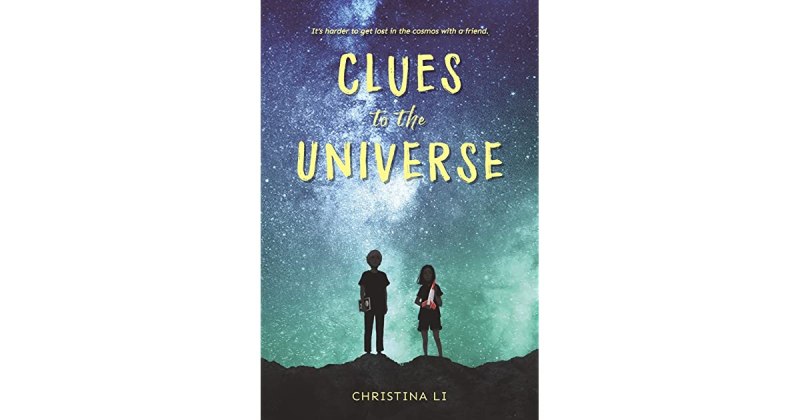“What was the best thing I could do right now, in this situation, to try and make things even a tiny bit better?”
This is the question Ro Geraghty asks herself continually after her father is killed in an accident with a drunk driver: What is the “Next Best Step?”
Set to release on Jan. 12, “Clues to the Universe” is the debut novel from Christina Li ’21. Told through the perspectives of two middle school outcasts who become unlikely friends, their story is a heartfelt portrayal of dealing with grief and loss at an early age.
After switching schools due to the death of her father, aspiring rocket scientist Ro befriends Benji, an artist who loves drawing and reading space comics. Benji’s father, David Allen Burns, left their family years ago, but Benji is convinced that there are clues to finding him in “Spacebound,” a comic book series written by his dad. The two of them form an ambitious pact: Ro will help Benji search for his missing father, while he will help her build a rocket for the science fair.
Amid obstacles of bullying and failed rocket tests, Ro and Benji undertake a journey that brings them across the country and deeper into their own identities.
Grief and loss have always been popular themes for writers, but Li’s decision to explore them through the lens of a middle-grade novel provides a fresh and surprisingly hard-hitting perspective. Her straightforward prose leaves the sentiments bare and unadorned, allowing them to stand out in their simplicity:
“You think that they’ll come back, but then you realize it all over again that they’re never coming back and your stomach starts hurting and you don’t know how to make it stop,” Ro says.
At the same time, Li reveals a subtle difference in the dimensions of grief felt by Ro and Benji. Ro’s difficulty in processing the permanent loss of her father manifests as an obsession with helping Benji find his:
“A tiny part of me, buried deep down, had yearned for Benji to find his dad because I wanted mine back. It was this part that wished, in an aching way, that getting my dad back was as easy — as possible — as putting a star over a city on a map and chasing it down winding roads until I finally saw him and everything was whole again.”
However, Benji’s own drive toward finding his father is marred by the uncertainty of what will happen upon seeing him again. David Allen Burns chose to walk out on his wife and two sons, while Ro’s father was given no choice.
Aside from the novel’s primary focus on the impact of Ro and Benji’s absent fathers, Li also expertly fleshes out Ro’s Chinese American identity in a way designed to inspire readers like her middle school self. In a letter that precedes the first chapter, she writes:
“As one of the few Asian kids in my Midwestern hometown, I was reluctant to embrace the culture of my Chinese American immigrant family. Time and time again, I found myself hesitant to fully accept my identity, and to pursue the things I loved to do.”
As an ABC (American Born Chinese) person myself, these details felt both authentic and natural.
She covers the all-too-familiar dinner parties of Chinese New Year, mentioning dishes like char siu, chicken feet and sesame balls. Ro’s mom calls her “baobao,” a common Chinese term of endearment meaning “treasure” or “baby.”
On her first day at the new school, other girls are ignorant but offensive in their remarks, commenting: “What is she?…she looks kind of Japanese or something…her eyes look different.”
I saw some of my own past experiences mirrored in this book, and Ro’s pride in her identity and her passions make her a powerful role model for anyone learning to embrace themselves.
After being pranked by Drew Balonik, the school bully, Ro and Benji get into an argument when Benji stays silent instead of standing up for her. She asks, “What’s wrong with wanting to figure out how fast the earth rotates around the sun or wanting to launch a rocket because I want to know things? Because I actually care?”
Ro and Benji have a few major disputes in the second half of the novel, yet not all of them are clearly explained past the argument itself. In order to show increased emotional growth and maturity, a longer reconciliation process would have been more impactful than the convenient plot points that moved the story along.
The search for Benji’s father through the “Spacebound” comics also ended abruptly with a type of deus ex machina construction, but the scenes that followed were exciting and invigorating enough to make up for it.
Despite these small shortcomings, “Clues to the Universe” is a genuine and encouraging read about the power of friendship in the face of grief and loss. The ending leaves many unanswered questions that could be expanded upon in a sequel, if Li chooses to write one.
Whether Li chooses to continue the story of Ro and Benji’s friendship or decides to start anew, she has established herself through “Clues to the Universe” as a strong and compelling debut author.
Contact Ellie Wong at elliew2 ‘at’ stanford.edu.
